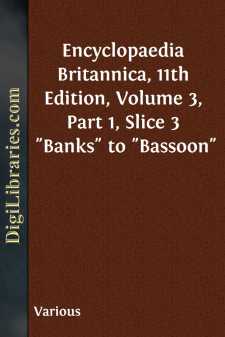Categories
- Antiques & Collectibles 13
- Architecture 36
- Art 48
- Bibles 22
- Biography & Autobiography 813
- Body, Mind & Spirit 142
- Business & Economics 28
- Children's Books 15
- Children's Fiction 12
- Computers 4
- Cooking 94
- Crafts & Hobbies 4
- Drama 346
- Education 46
- Family & Relationships 57
- Fiction 11828
- Games 19
- Gardening 17
- Health & Fitness 34
- History 1377
- House & Home 1
- Humor 147
- Juvenile Fiction 1873
- Juvenile Nonfiction 202
- Language Arts & Disciplines 88
- Law 16
- Literary Collections 686
- Literary Criticism 179
- Mathematics 13
- Medical 41
- Music 40
- Nature 179
- Non-Classifiable 1768
- Performing Arts 7
- Periodicals 1453
- Philosophy 64
- Photography 2
- Poetry 896
- Political Science 203
- Psychology 42
- Reference 154
- Religion 513
- Science 126
- Self-Help 84
- Social Science 81
- Sports & Recreation 34
- Study Aids 3
- Technology & Engineering 59
- Transportation 23
- Travel 463
- True Crime 29
Encyclopaedia Britannica, 11th Edition, Volume 3, Part 1, Slice 3 "Banks" to "Bassoon"
by: Various
Categories:
Description:
Excerpt
BANKS, GEORGE LINNAEUS (1821-1881), British miscellaneous writer, was born at Birmingham on the 2nd of March 1821. After a brief experience in a variety of trades, he became at the age of seventeen a contributor to various newspapers, and subsequently a playwright, being the author of two plays, a couple of burlesques and several lyrics. Between 1848 and 1864 he edited in succession a variety of newspapers, including the Birmingham Mercury and the Dublin Daily Express, and published several volumes of miscellaneous prose and verse. He died in London on the 3rd of May 1881.
BANKS, SIR JOSEPH, Bart. (1743-1820), English naturalist, was born in Argyle Street, London, on the 13th of February 1743. His father, William Banks, was the son of a successful Lincolnshire doctor, who became sheriff of his county, and represented Peterborough in parliament; and Joseph was brought up as the son of a rich man. In 1760 he went to Oxford, where he showed a decided taste for natural science and was the means of introducing botanical lectures into the university. In 1764 he came into possession of the ample fortune left by his father, and in 1766 he made his first scientific expedition to Newfoundland and Labrador, bringing back a rich collection of plants and insects. Shortly after his return, Captain Cook was sent by the government to observe the transit of Venus in the Pacific Ocean, and Banks, through the influence of his friend Lord Sandwich, obtained leave to join the expedition in the "Endeavour," which was fitted out at his own expense. He made the most careful preparations, in order to be able to profit by every opportunity, and induced Dr Daniel Solander, a distinguished pupil of Linnaeus, to accompany him. He even engaged draughtsmen and painters to delineate such objects of interest as did not admit of being transported or preserved. The voyage occupied three years and many hardships had to be undergone; but the rich harvest of discovery was more than adequate compensation. Banks was equally anxious to join Cook's second expedition and expended large sums in engaging assistants and furnishing the necessary equipment; but circumstances obliged him to relinquish his purpose. He, however, employed the assistants and materials he had collected in a voyage to Iceland in 1772, returning by the Hebrides and Staffa. In 1778 Banks succeeded Sir John Pringle as president of the Royal Society, of which he had been a fellow from 1766, and held the office until his death. In 1781 he was made a baronet; in 1795 he received the order of the Bath; and in 1797 he was admitted to the privy council. He died at Isleworth on the 19th of June 1820. As president of the Royal Society he did much to raise the state of science in Britain, and was at the same time most assiduous and successful in cultivating friendly relations with scientific men of all nations. It was, however, objected to him that from his own predilections he was inclined to overlook and depreciate the labours of the mathematical and physical sections of the Royal Society and that he exercised his authority somewhat despotically....












